The Amazonian Peoples “Have a Right To Hear the Gospel,” he says — and Lays Out His Vision for How
By Christina Deardurff with Reporting by Vatican News

Pilgrims travel on boats as they accompany the statue of Our Lady of Nazareth during an annual river procession and pilgrimage along the Apeu River to a chapel in Macapazinho, Brazil (CNS photo)
Querida Amazonia — “Dear Amazonia” — is Pope Francis’ long-awaited Apostolic Exhortation, written in response to the work of last fall’s Synod on the Amazon, held in Rome October 6-27, and released February 12. Despite widespread anticipation that the document would open the door to the possibility of married, and even female, clergy, no such discussion is advanced by the Pope in the Exhortation. Instead, the Pope accentuates the need for more effective evangelization with a renewed missionary zeal, and for efforts to build up the existing faith of the indigenous peoples of Amazonia in a way that respects their cultures and yet is authentically Catholic.
“They have a right to hear the Gospel,” he says, “and above all that first proclamation, the kerygma, which is ‘the principal proclamation, the one which we must hear again and again in different ways, the one which we must announce one way or another.’It proclaims a God who infinitely loves every man and woman and has revealed this love fully in Jesus Christ, crucified for us and risen in our lives.”
In emphasizing the centrality of the Eucharist, Francis writes, “No Christian community is built up which does not grow from and hinge on the celebration of the most holy Eucharist … This urgent need leads me to urge all bishops, especially those in Latin America, not only to promote prayer for priestly vocations, but also to be more generous in encouraging those who display a missionary vocation to opt for the Amazon region.”
The Pope rejected the idea that female ordination was an answer to the priest shortage, or that women could not be full participants in the life of the Church without being ordained, calling that an attitude which would “clericalize women.”
On the subject of “inculturation” of the Church in the Amazon region, the Pope asks for revision to “the structure and content of both initial and ongoing priestly formation” to be more pastoral and in dialogue with Amazonian cultures. Francis says that “the stable presence of mature and lay leaders endowed with authority” is required in the region, calling for more permanent deacons and women religious to address the Amazon’s challenges. Since the “mature lay leaders” seems to refer to the viri probati that have been proposed by some as potential married candidates for the ordained priesthood, it is clear that the Pope is rejecting the idea of making these men priests, while recommending them instead for the diaconate.
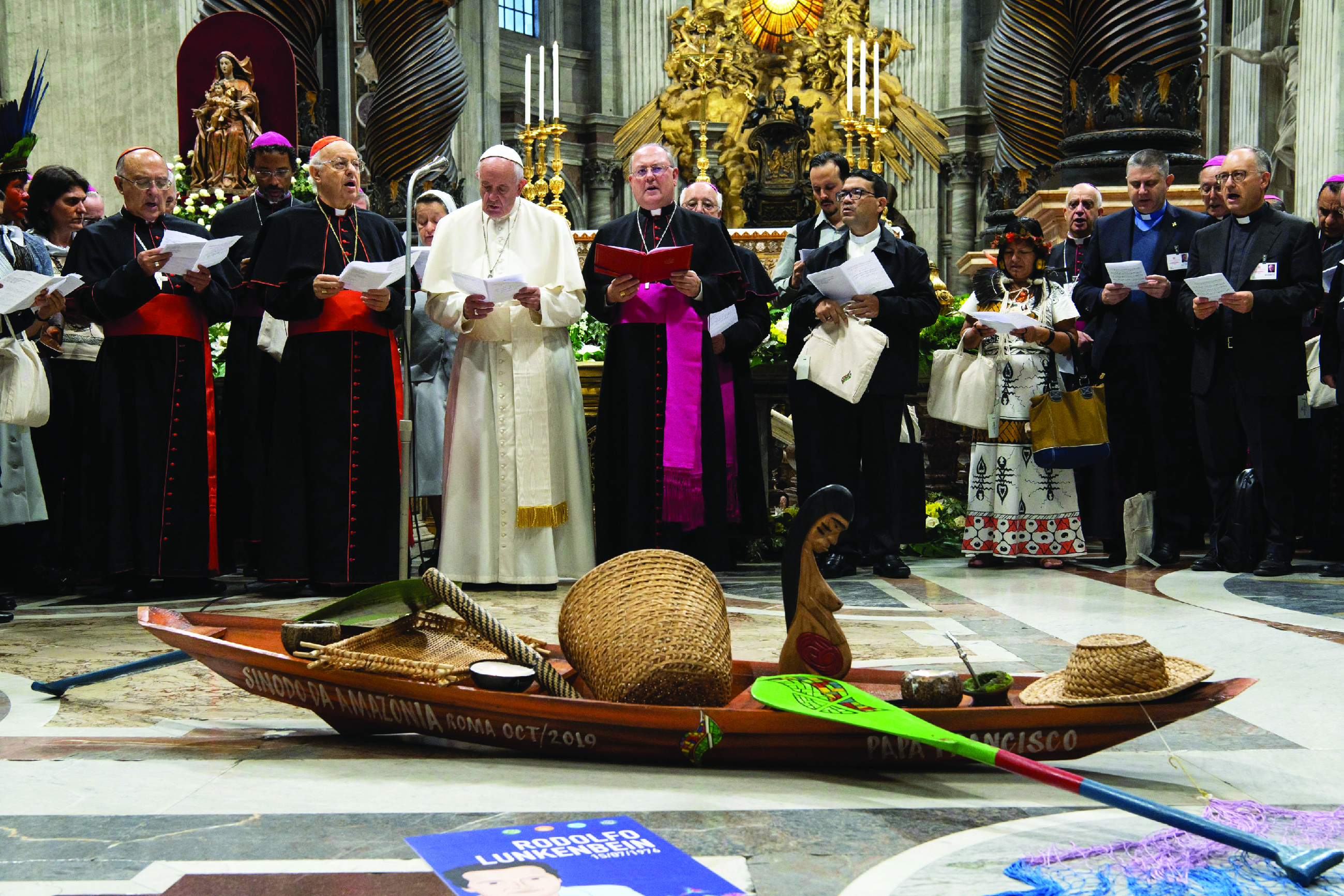
Pope Francis attends a prayer service at the start of the first session of the Synod of Bishops for the Amazon at the Vatican on October 7, 2019 (CNS photo)
The Pope calls for revision to “the structure and content of both initial and ongoing priestly formation” to be more pastoral and sensitive to Amazonian cultures. And, he wrote, “Let us not be quick to describe as superstition or paganism certain religious practices that arise spontaneously from the life of peoples.”
“It is possible,” he adds, “to take up an indigenous symbol in some way, without necessarily considering it as idolatry.” The Pope’s words call to mind the embattled “Pachamama” statuettes thrown into the Tiber River by a disapproving layman after being used in at least one seemingly pagan ceremony at the Vatican.
“A myth charged with spiritual meaning,” he continues, “can be used to advantage and not always considered a pagan error. Some religious festivals have a sacred meaning and are occasions for gathering and fraternity, albeit in need of a gradual process of purification or maturation.”
More than half of the Exhortation is structured around what Francis called his four “dreams” for the Amazon region, which he calls his “social,” “cultural,” “ecological” and “ecclesial” dreams.
His social dream for the Amazon region is that the Church take the side of the poor and oppressed, support healthy family and social institutions, and develop “networks of solidarity and development.”
Human relationships, he says, “are steeped in the surrounding nature” and experience a real “uprootedness” when they are “forced to migrate to the cities.”
Denouncing the evil of corruption which poisons the State and its “broken” institutions, he expresses the hope that the Amazon might become “a place of social dialogue,” first of all, with the least, and that the voice of the poor might be “the most authoritative voice” in the Amazon region.
Under the heading of “cultural dream,” Francis speaks of “intercultural encounter.”
Diversity should, therefore, not be “a wall” but “a bridge” which rejects “a completely enclosed ‘indigenism,’” he says, and he urges the Amazonian peoples to reject “cultural colonization” and a “consumerist vision of human beings.”
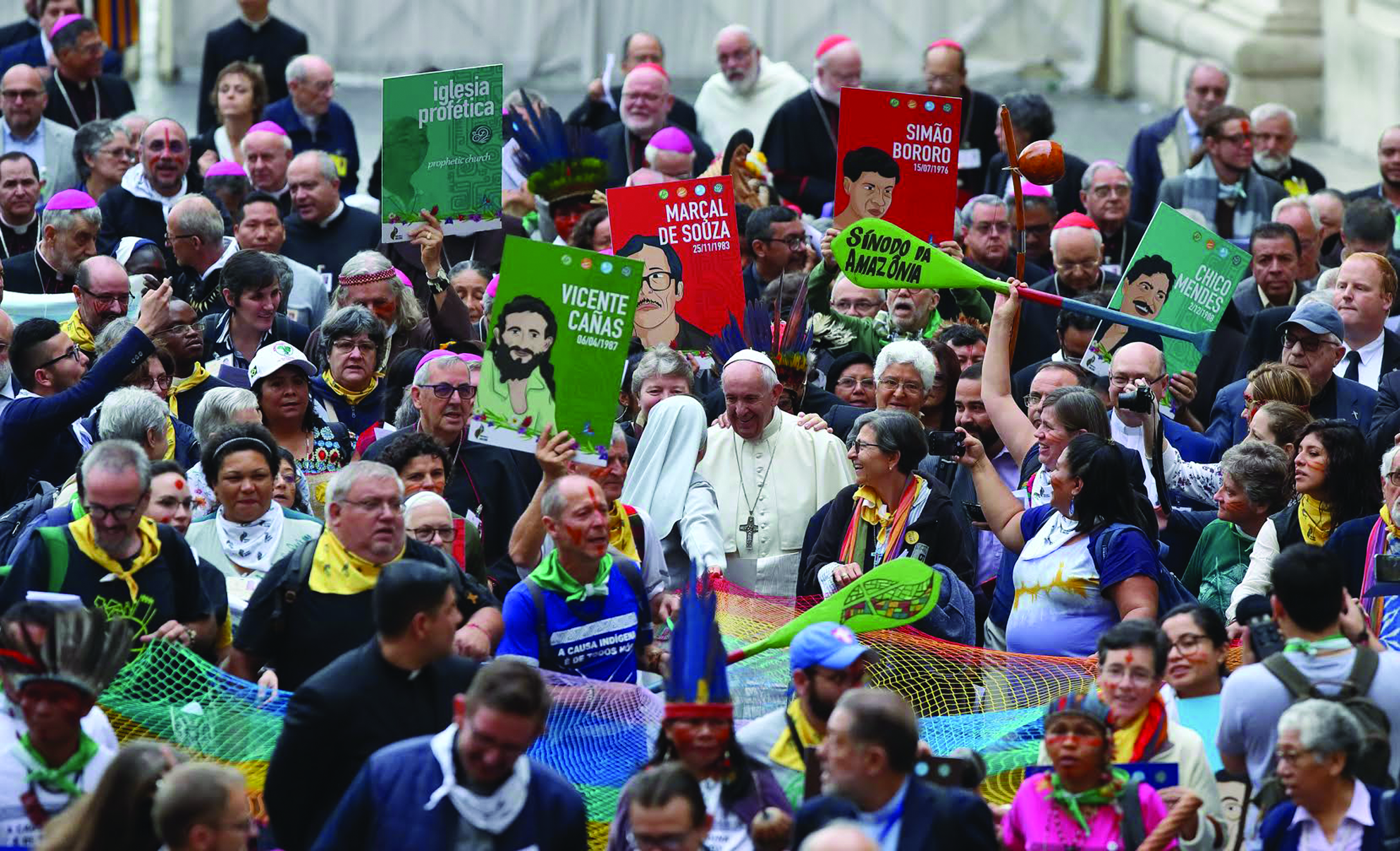
Opposite, the procession from St. Peter’s Basilica to the New Synod Hall
In articulating his “ecological dream,” Francis cites poets like Pablo Neruda and their ability to make tangible the beauty of Amazonia, who “help free us from the technocratic and consumerist paradigm that destroys nature.” Taking care of our brothers and sisters as the Lord takes care of us is “the first ecology that we need,” he says.Caring for the environment and caring for the poor are “inseparable.”
Exploitation by international interests, says Francis, must be countered by “responsibility on the part of national governments” for the welfare of their people and their environment. In laying out his “ecclesial” dream, the Pope speaks at length about inculturation — of the Gospel, and of the Liturgy, especially, saying that incorporating “many elements proper to the experience of indigenous peoples” like their “native forms of expression in song, dance, rituals, gestures and symbols” would respond to the Second Vatican Council’s call for “this effort to inculturate the liturgy among indigenous peoples.”
The Pope’s explanation fell far short of the demand for an Amazonian “rite” for the Mass that some had strongly urged.
Francis calls for a greater missionary presence in the region, while also encouraging greater involvement of the laity, and envisions innovative ministries that respond to the region’s unique spiritual needs — discounting, however, any suggestion of a female priesthood. He concludes Querida Amazonia with a prayer to the Mother of the Amazon Region.
“Mother, look upon the poor of the Amazon region,” he prays, “for their home is being destroyed by petty interests…Touch the hearts of the powerful, for, even though we sense that the hour is late, you call us to save what is still alive.”
Reactions to Querida Amazonia
Some See Francis as Presenting a “Third Way”
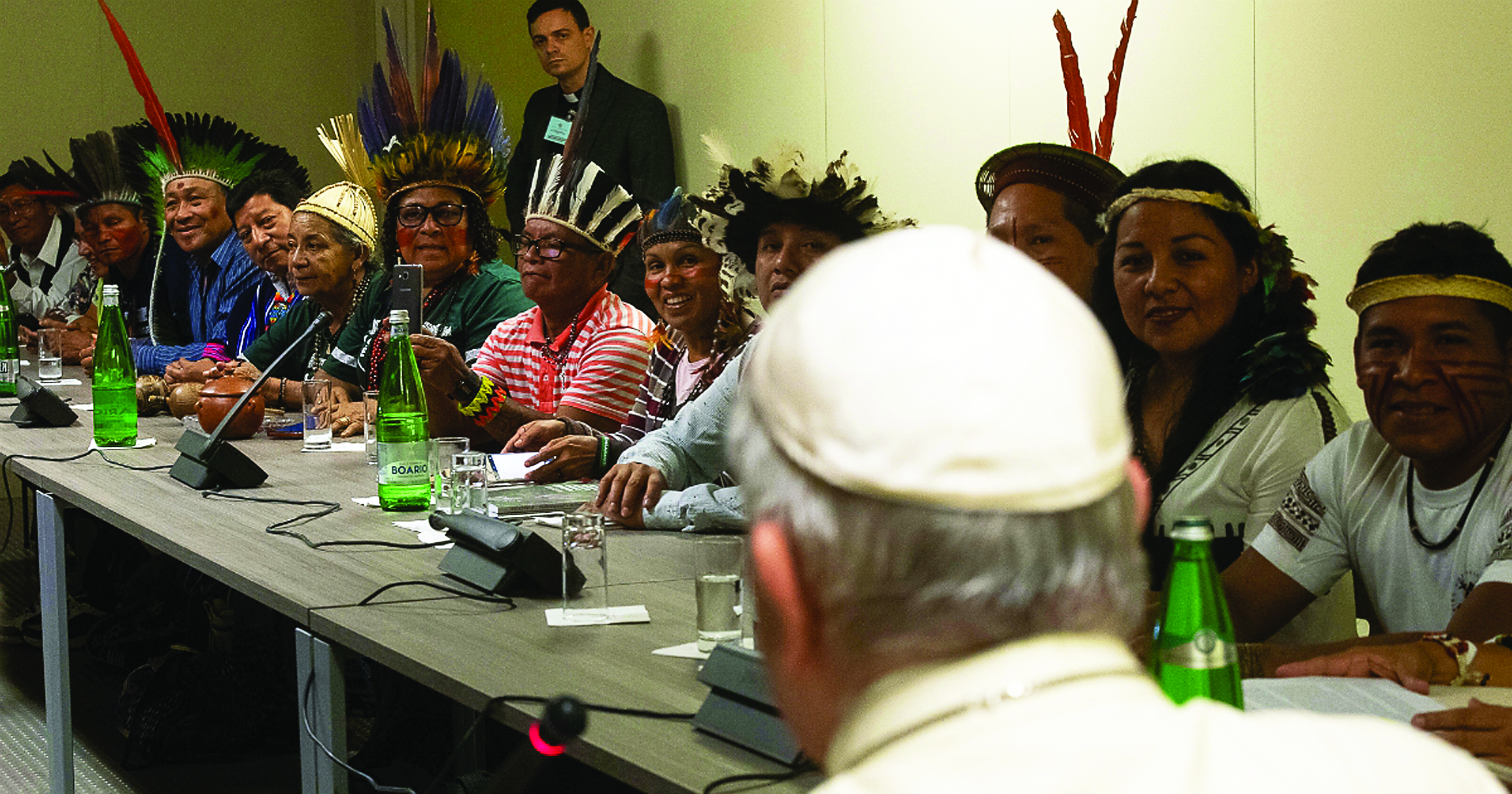
October 2019. Pope Francis encounters members of the Amazon region’s indigenous community during the Synod in the Paul VI Audience Hall.
Reactions to the Pope’s Apostolic Exhortation Querida Amazonia (Dear Amazonia), not unexpectedly, have mostly fallen along ideological lines.
Feminists were upset about the Pope’s use of the language of the “complementarity” of the sexes and his dismissal of the supposed need for female priests in order for women to be fully a part of the Church (one progressive Catholic journal headlined: “Disappointment, Outrage over Papal Document on the Amazon”).
Conservatives were generally pleasantly surprised that Francis declined to talk about married priests. Liberals were generally pleased at his condemnation of international exploitation of the Amazon region and calls for the region’s “ecology” to be respected.
Other commentators discerned, amidst the polarization of views on many issues, an attempt on Francis’ part to present a “third way” — what has been called a “signature Jesuit” approach — which is to continue to hold opposing views in tension, without deciding one way or another, and let the Holy Spirit work it out, eventually, in the way He wishes.
Some believe Francis dealt with the subject of married priests in this way: neither outright condemnation nor outright support, but instead inviting people to consider the nature of the priesthood, and let prayerful consideration flow from this. Some connected this approach to that taken by Cardinal Robert Sarah and Pope Emeritus Benedict in their book on the subject, From the Depths of our Hearts, in which they expounded on the question: “What does it mean to be a priest?”
Among the significant positive commentaries on the Exhortation wasthat of Cardinal Gerhard Müller, former Prefect of the Congregation for the Doctrine of the Faith, who had leveled pointed criticism at the Amazon Synod’s previous documents. Müller says the “hermeneutic” by which to understand the letter must be a Catholic one, “not characterized by dialecticism” but by “bringing all the statements of the revealed faith and the philosophical, scientific and everyday knowledge of the world into a synthesis.” On February 12 in the National Cathoic Register, Müller said the text “does not want to fuel existing political, ethnic and inner-Church conflicts and conflicts of interest, but rather to overcome them.”
Exhortation Envisions A “Laicized Church”
By “Fr. Pio Pace” (excerpts)
from the Rorate-Caeli.blogspot.com
Will married viri probati be ordained to the priesthood? …[Querida Amazonia] does not reject the possibility (as it has been hastily claimed): it simply does not mention it. In fact, the exhortation goes much further, in the direction of a Laicized Church… the common priesthood of the baptized largely absorbs the priestly ministry, being mixed up with it…
Inculturation, says the writer, should also be expressed in the “ecclesial organization and ministry.” The priestly ministry should be rethought. It should not be reduced to the priest-cleric, whose specific power is that of consecrating and of forgiving sins, which is indispensable to ensure “a more frequent celebration of the Eucharist, even in the remotest and most isolated communities.” On the other hand, the hierarchical power in the Church, which belongs to the priestly ministry, is not specific to the ordained minister: lay people, remaining lay people, will be able to exercise this other facet of the priestly ministry and to “proclaim God’s word, teach, organize communities, celebrate certain sacraments…”
Those fixated upon the ordination of married men are, in sum, accused of clericalism, since it is much more important to promote a kind of Lay Church:“This requires the Church to be open to the Spirit’s boldness, to trust in, and concretely to permit, the growth of a specific ecclesial culture that is distinctively lay.”
A “Paradigm Shift”
By Jules Gomez
Excerpted from ChurchMilitant.com
Titled Querida Amazonía, the exhortation seemed to signal a paradigm shift in the pontificate of Francis, as it resoundingly affirmed the evangelization of the Amazonian peoples in the words of the apostle Paul to the Corinthians: “We are not ashamed of Jesus Christ” and “Woe to me if I do not preach the Gospel!”
The much-anticipated final document, released to the media on Wednesday afternoon, provoked questions as to the magisterial authority of the exhortation and whether the papal declaration had closed the door to controversial proposals like the ordination of married men…
A Blow To Some?
Regular ITV contributor William Doino, Jr., in his commentary on Querida Amazonia, said the Holy Father’s new document on the Amazon region appears to be a significant blow to “progressive” demands, and a strong re-affirmation of the Gospel of Jesus Christ.
“As we reflect upon Francis’ new exhortation,” he said, “it’s relevant to recall that many of our progressive brethren had already begun their victory dance well before this document was released, but it turns out that the Pope has not given them what they wanted and expected.”
Doino notes that Francis refused to approve a married priesthood and female diaconate for the Amazon region, stating: “The fact that the Pope personally does not explicitly endorse the [very progressive] reform plans of the Amazon’s Final Document can be seen as something that might very well discourage and even anger the progressive camp.”
“The Pope’s ‘four strong paragraphs’ (62-65) resoundingly reaffirm the Gospel of Jesus Christ, declaring it must be proclaimed loudly and clearly in the Amazon region — indeed everywhere — for that is the Church’s highest mission, even as religious and laity should strive to meet the needs of all the Church’s diverse members with love and compassion. I read the Pope’s comments, for example, about bringing about a process of ‘purification and maturation,’ when necessary, as a call to gently but firmly correct erroneous religious or cultural practices — something good missionaries have been doing for centuries.”
But blogger Steven O’Reilly, in a post on Roma Locuta Est, pointed out that at the outset of his Exhortation, Francis does not abrogate the Final Document issued by the Synod itself, which contains the contentious proposals (e.g., ordained women deacons, married priests) which Francis himself declined to discuss. Instead, Francis approvingly draws our attention to the Synod Final Document, saying: “I will not go into all of the issues treated at length in the Final Document. Nor do I claim to replace that text or duplicate it.”
“At the same time,” Francis goes on, “I would like to officially present the Final Document, which sets forth the conclusions of the Synod…. I have preferred not to cite the Final Document in this Exhortation, because I would encourage everyone to read it in full…. May the pastors, consecrated men and women and lay faithful of the Amazon region strive to apply it….”
“Vintage Bergoglio”
By Austin Ivereigh
Excerpted from TheTablet.co.uk
While the world was waiting with bated breath for a historic decision on whether to ordain married men in Amazonia, Pope Francis was busy going in a very different direction. Some will see Beloved Amazonia as ducking an historic challenge, leaving the Church in limbo in order to avoid a contentious decision that would have deepened divisions. But right at the end of the document, Francis offers a revealing window onto his discernment: Beloved Amazonia is less about avoiding conflict than about seeing another path where the Holy Spirit is calling the Church.
In paragraph 104 the Pope observes that when pastoral workers propose “opposed forms of ecclesial organization” in response to challenges, it is likely that the true answer lies in “transcending the two approaches and finding other, better ways, perhaps not yet even imagined.” In the following paragraph he says solutions often come in the form of a “greater gift” that God is offering from which “there will pour forth as from an overflowing fountain the answers that contraposition did not allow us to see.”
“I Dream of an Amazon Region…”
From Chapter One: “Dreams for the Amazon Region”
Paragraphs 5-17
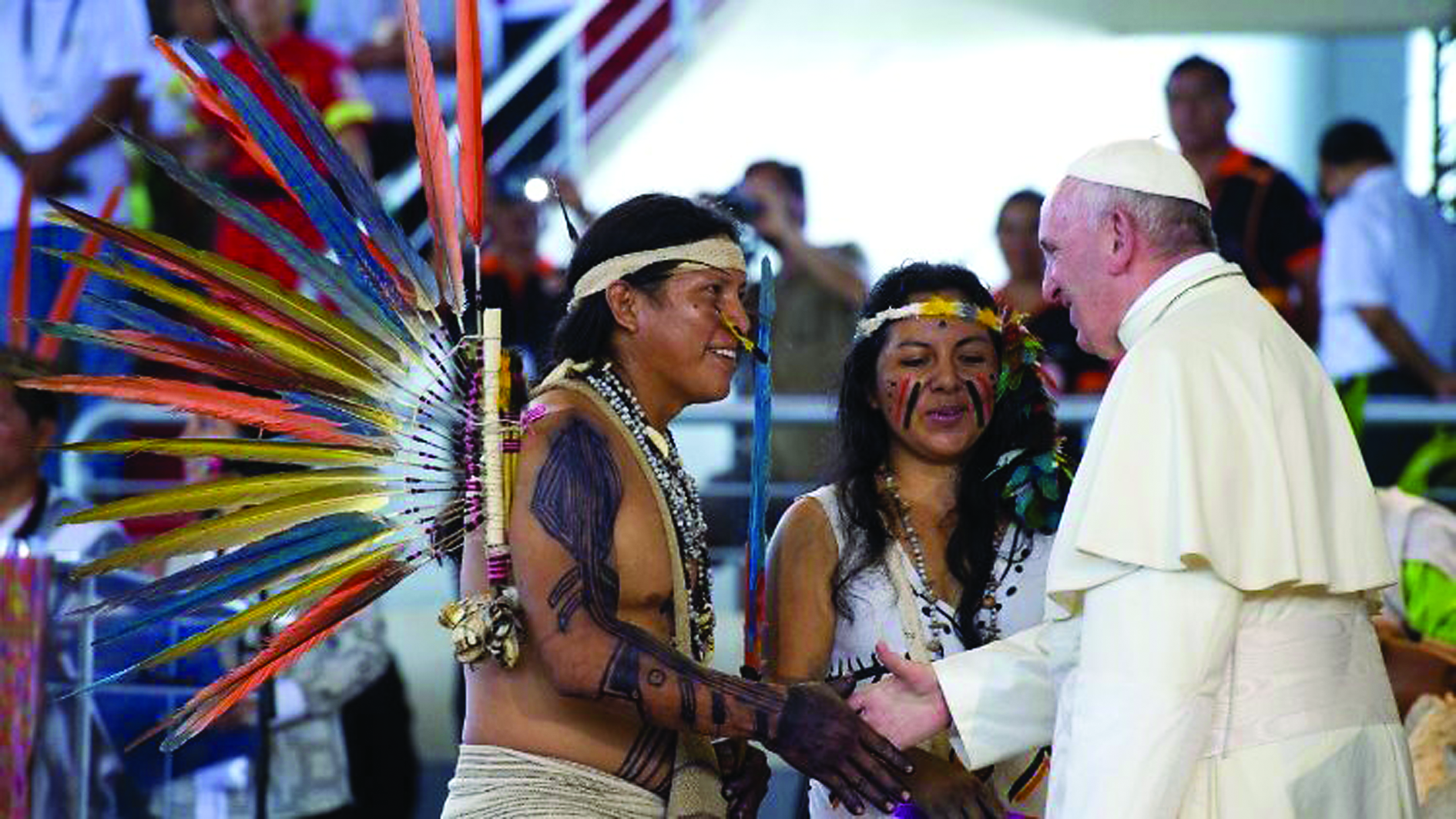
January 2018. Apostolic journey in Chile and Peru, Pope Francis encounters indigenous people of the Amazon.
5. The Amazon region is a multinational and interconnected whole, a great biome shared by nine countries: Brazil, Bolivia, Colombia, Ecuador, Guyana, Peru, Surinam, Venezuela and the territory of French Guiana.
Yet I am addressing the present Exhortation to the whole world. I am doing so to help awaken their affection and concern for that land which is also “ours,” and to invite them to value it and acknowledge it as a sacred mystery.
But also because the Church’s concern for the problems of this area obliges us to discuss, however briefly, a number of other important issues that can assist other areas of our world in confronting their own challenges.
6. Everything that the Church has to offer must become incarnate in a distinctive way in each part of the world, so that the Bride of Christ can take on a variety of faces that better manifest the inexhaustible riches of God’s grace. Preaching must become incarnate, spirituality must become incarnate, ecclesial structures must become incarnate. For this reason, I humbly propose in this brief Exhortation to speak of four great dreams that the Amazon region inspires in me.
7. I dream of an Amazon region that fights for the rights of the poor, the original peoples and the least of our brothers and sisters, where their voices can be heard and their dignity advanced.
I dream of an Amazon region that can preserve its distinctive cultural riches, where the beauty of our humanity shines forth in so many varied ways.
I dream of an Amazon region that can jealously preserve its overwhelming natural beauty and the superabundant life teeming in its rivers and forests.
I dream of Christian communities capable of generous commitment, incarnate in the Amazon region, and giving the Church new faces with Amazonian features.
From Chapter One
“A Social Dream”
Paragraphs 26-27
26. The Amazon region ought to be a place of social dialogue, especially between the various original peoples, for the sake of developing forms of fellowship and joint struggle. The rest of us are called to participate as “guests” and to seek out with great respect paths of encounter that can enrich the Amazon region. If we wish to dialogue, we should do this in the first place with the poor. They are not just another party to be won over, or merely another individual seated at a table of equals. They are our principal dialogue partners, those from whom we have the most to learn, to whom we need to listen out of a duty of justice, and from whom we must ask permission before presenting our proposals. Their words, their hopes and their fears should be the most authoritative voice at any table of dialogue on the Amazon region. And the great question is: “What is their idea of ‘good living’ for themselves and for those who will come after them?”
27. Dialogue must not only favor the preferential option on behalf of the poor, the marginalized and the excluded, but also respect them as having a leading role to play. Others must be acknowledged and esteemed precisely as others, each with his or her own feelings, choices and ways of living and working. Otherwise, the result would be, once again, “a plan drawn up by the few for the few,” if not “a consensus on paper or a transient peace for a contented minority.” Should this be the case, “a prophetic voice must be raised,” and we as Christians are called to make it heard.
From Chapter Two
“A Cultural Dream”
Paragraph 33
33. Here I would like to point out that “a consumerist vision of human beings, encouraged by the mechanisms of today’s globalized economy, has a leveling effect on cultures, diminishing the immense variety which is the heritage of all humanity.”This especially affects young people, for it has a tendency to “blur what is distinctive about their origins and backgrounds, and turn them into a new line of malleable goods.” In order to prevent this process of human impoverishment, there is a need to care lovingly for our roots,since they are “a fixed point from which we can grow and meet new challenges.” I urge the young people of the Amazon region, especially the indigenous peoples, to “take charge of your roots, because from the roots comes the strength that will make you grow, flourish and bear fruit.” For those of them who are baptized, these roots include the history of the people of Israel and the Church up to our own day. Knowledge of them can bring joy and, above all, a hope capable of inspiring noble and courageous actions.
From Chapter Three
“An Ecological Dream”
Paragraphs 42
42. If the care of people and the care of ecosystems are inseparable, this becomes especially important in places where “the forest is not a resource to be exploited; it is a being, or various beings, with which we have to relate.” The wisdom of the original peoples of the Amazon region “inspires care and respect for creation, with a clear consciousness of its limits, and prohibits its abuse.To abuse nature is to abuse our ancestors, our brothers and sisters, creation and the Creator, and to mortgage the future.”
When the indigenous peoples “remain on their land, they themselves care for it best,”[51] provided that they do not let themselves be taken in by the siren songs and the self-serving proposals of power groups. The harm done to nature affects those peoples in a very direct and verifiable way, since, in their words, “we are water, air, earth and life of the environment created by God. For this reason, we demand an end to the mistreatment and destruction of mother Earth. The land has blood, and it is bleeding; the multinationals have cut the veins of our mother Earth.”
From Chapter Four
“An Ecclesial Dream”
Paragraphs 63-64
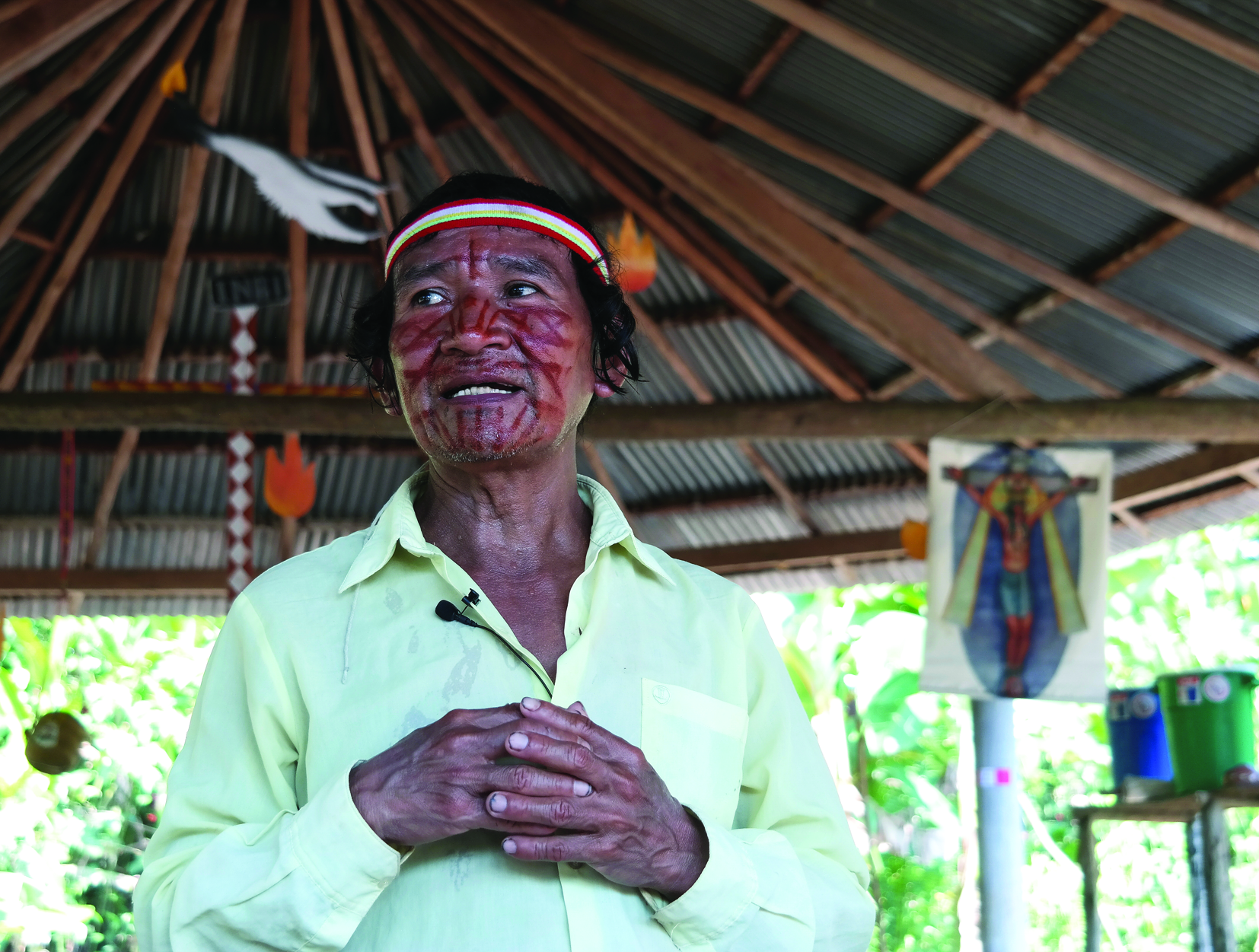
Deacon Shainkiam Yampik Wananch prays in a chapel in Wijint, a village in the Peruvian Amazon
63. An authentic option for the poor and the abandoned, while motivating us to liberate them from material poverty and to defend their rights, also involves inviting them to a friendship with the Lord that can elevate and dignify them. How sad it would be if they were to receive from us a body of teachings or amoral code, but not the great message of salvation, the missionary appeal that speaks to the heart and gives meaning to everything else in life. Nor can we be content with a social message. If we devote our lives to their service, to working for the justice and dignity that they deserve, we cannot conceal the fact that we do so because we see Christ in them and because we acknowledge the immense dignity that they have received from God, the Father who loves them with boundless love.
64.They have a right to hear the Gospel, and above all that first proclamation, the kerygma, which is “the principal proclamation, the one which we must hear again and again in different ways, the one which we must announce one way or another.” It proclaims a God who infinitely loves every man and woman and has revealed this love fully in Jesus Christ, crucified for us and risen in our lives.
I would ask that you re-read the brief summary of this “great message” found in Chapter Four of the Exhortation Christus Vivit. That message, expressed in a variety of ways, must constantly resound in the Amazon region.
Without that impassioned proclamation, every ecclesial structure would become just another NGO and we would not follow the command given us by Christ: “Go into all the world and preach the Gospel to the whole creation” (Mk 16:15).






Facebook Comments